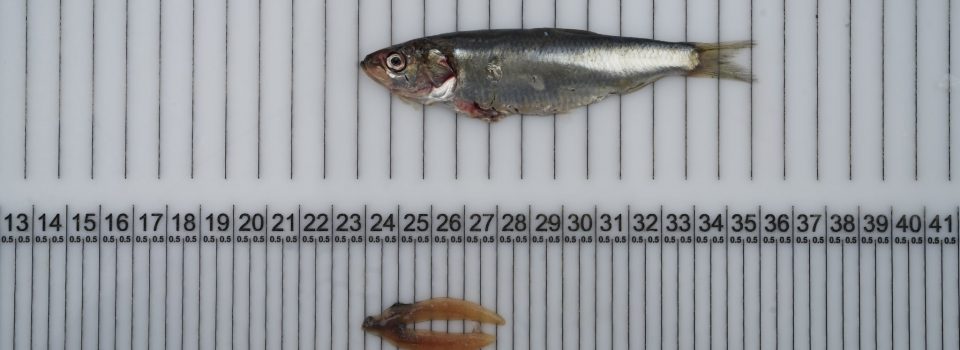Workshop on results of the study of the biochemical composition of common sardine gonads
January 8th, 2024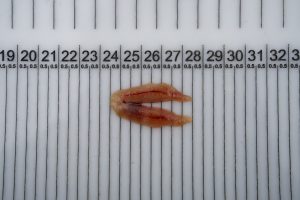 Research Results workshop was carried out by Universidad Catolica de la Santisima Concepcion funded by SAFA Program
Research Results workshop was carried out by Universidad Catolica de la Santisima Concepcion funded by SAFA Program
“Viability and biochemical-ecological common sardine gonads composition (Strangomera bentincki) in Biobío region, period 2017-2022 workshop ” was held at IFOP Talcahuano, through ZOOM platform. This event, organized by tUniversidad Catolica de la Santísima Concepción (UCSC) and financed by SAFA Program, had Dr. Ángel Urzua outstanding participation, at UCSC Sciences Faculty professor, who led the study together with his team composed by Fabián Guzmán-Rivas and Marco Quispe-Machaca. IFOP’s collaboration with common sardine gonads samples from previous years stored by researchers Sergio Mora and Juan Ortega, together with Biobío Regional Government financial support to SAFA Program, which were fundamental for this research completion.
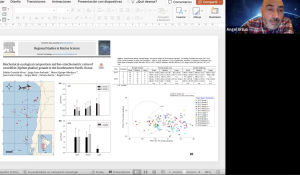 This research’s main objective was to examine new biochemical indicators that complement biological-reproductive indicators already carried out by IFOP, with greater precision and in a more appropriate time interval, exploring their potential as a “new complementary fisheries indicator” evaluating gonads“condition and quality ” .
This research’s main objective was to examine new biochemical indicators that complement biological-reproductive indicators already carried out by IFOP, with greater precision and in a more appropriate time interval, exploring their potential as a “new complementary fisheries indicator” evaluating gonads“condition and quality ” .
The workshop brought together representatives and leaders of artisanal fishing, industrial fishermen from the Biobío, government authorities, regional entities, scientific peers, research institutions from the Biobío region, as well as researchers and IFOP workers.
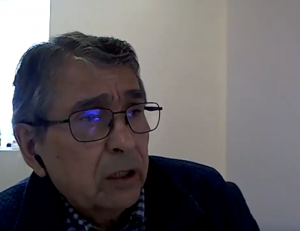 Obtained results revealed common sardine gonads notable biochemical composition variations (glucose, proteins, lipids, energy), quality (fatty acid profile) and biostoichiometric ratios (L/P, L/G, MUFA/SAT, PUFA/SAT) . In response to factors such as temperature, food availability, coastal upwelling and climatic-oceanographic events (ENSO). These changes can affect their life cycle, influence recruitment and growth processes, and have an impact on biomass and population density.
Obtained results revealed common sardine gonads notable biochemical composition variations (glucose, proteins, lipids, energy), quality (fatty acid profile) and biostoichiometric ratios (L/P, L/G, MUFA/SAT, PUFA/SAT) . In response to factors such as temperature, food availability, coastal upwelling and climatic-oceanographic events (ENSO). These changes can affect their life cycle, influence recruitment and growth processes, and have an impact on biomass and population density.
At the end of the event, consultations and discussions related to the study and fisheries management were carried out, further enriching the workshop’s content.
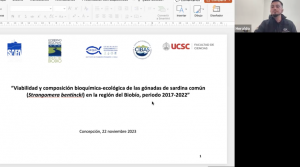 Heraldo Álvarez, Project Manager, and Juan Olivares, SAFA Program’s Alternate Head, concluded that the study provides clues about environmental influence and demographic factors on common sardine gonads biochemical composition. Both expressed satisfaction and considered it positive to continue with more detailed studies, not only on common sardine, but also on anchovy, given mixed fishery nature.
Heraldo Álvarez, Project Manager, and Juan Olivares, SAFA Program’s Alternate Head, concluded that the study provides clues about environmental influence and demographic factors on common sardine gonads biochemical composition. Both expressed satisfaction and considered it positive to continue with more detailed studies, not only on common sardine, but also on anchovy, given mixed fishery nature.
Press related links:
